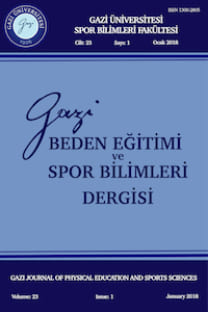Olimpiyat Oyunlarının Ülke Ekonomilerine Etkileri ve Ekonomik Olarak Karşılaştırılması
Günümüzde tüm sportif etkinlikler ve organizasyonlar çok önemli bütçelerle organize edilmektedir. Kuşkusuz tüm spor organizasyonları içerisinde düzenlenen en saygın, en değerli ve en pahalı spor organizasyonu olimpiyat oyunlarıdır. Bu kuramsal çalışmada olimpiyat oyunlarının ülke ekonomilerine etkileri kısa, orta ve uzun vadeli olmak üzere karşılaştırılarak incelenmeye çalışılmıştır. Bu amacı karşılamak üzere betimsel tarama yöntemine başvurulmuştur. Ekonomik ve sosyal gelişmişlik endeksleri ile olimpiyat ekonomisinin doğrudan ilişkili bir ekonomik çıktı yarattığını söylemek mümkündür. Ekonomilerini çağın küreselleşme modeline uygun olarak neoliberal ekonomilere dönüştürmüş ve geliştirmiş ülkelerde ortaya çıkan yüksek maliyetler, bu yatırımlar için çok ciddi harcamalar gerektirmektedir. Ancak, dönüşümünü henüz tamamlayamamış ve daha az gelişmiş ekonomilerde maliyetler görece daha düşük kalmaktadır. Öte yandan, olimpiyat oyunları’nın ekonomik getirisi maliyetlere paralel olarak ekonomik ve sosyal gelişmişlik endeksleri ile doğru orantılıdır. Ekonomik dönüşümünü, sosyal ve siyasal süreçlerini tamamlamış ekonomiler ciddi bir iktisadi getiri yaratabilirken, ekonomik dönüşümünü, sosyal ve siyasal süreçlerini tamamlamamış ekonomiler iktisadi getiri yaratmakta zorlanmaktadırlar. Yapılan yatırımların ve harcamaların kısa vadede ekonomik daralmaya ve gerilemeye yol açtığı, orta ve uzun vade de ise olumlu geri dönüş sağladığı olası gözükmektedir.
Anahtar Kelimeler:
Olimpiyat oyunları, Olimpiyat oyunları ekonomisi, Atina, Pekin, Londra, Rio, Sydney
The Effects of the Olympic Games on the Economies of Countries and Their Economic Comparison
Today, all sport events are organized with massive budgets. Undoubtedly, the most prestigious, most significant and most expensive of all sport organizations is the Olympic Games. In this theoretical study, the short, medium- and long-term effects of the Olympic Games on the economies of countries were compared. To accomplish this, the descriptive survey model was used. It is possible that the economic and social development indices and the economy of the Olympics can create a related and direct output. The high costs incurred in countries that have transformed and developed their economies into neoliberal economies in line with the globalization model of the era, require very serious expenses for these investments. However, costs remain relatively low in countries that have not transformed and developed their economies. On the other hand, the economic returns of the Olympic Games are directly proportional to the economic and social development indices in line with the costs. While economies that have completed their economic transformation, social and political processes can create a serious economic return, economies that have not completed their economic transformation and social and political development have difficulty in creating an economic return. The investments and expenditures can result in short term economic contraction and regression, but can provide a positive medium and long term return.
Keywords:
Olympic games, Olympic games economy, Athens, Beijing, London, Rio, Sydney,
___
- Ak, Duygu. (2014). Olimpiyatların ev sahibi kente etkileri açısından değerlendirmesi. Eurasian Socioeconomic Studies, 1(2).
- Akşar, T. (2013). Olimpiyat düzenlemek akıl karı mı? Ülkeler neden olimpiyat düzenlerler? Futbol Ekonomisi (1 Eylül 2013). Erişim adresi: http://www.futbolekonomi.com/index.php/videolar/ 2730-olimpiyat-duezenlemek-akl-kar-m-uelkeler-neden-olimpiyat-duezenlerler.html
- Baade, R. A. ve Matheson, V. A. (2016). Going for the gold: The economics of the olympics. Journal of Economic Perspectives, 30(2).
- Blake, A. (2005). The economic impact of the London 2012 Olympics. Nottingham University Business School.
- Ersungur, Ş. ve Akıncı, M. (2013). 2011 Universiade kış oyunlarının Erzurum ekonomisi üzerindeki etkileri: Bir uygulama. Journal of Yaşar University, 30(8).
- Eurosport. Olimpiyat oyunları. (3 Ağustos 2016). Erişim Adresi: https://tr.eurosport.com/ olimpiyat-oyunlari/rio/2016/206-ulke-10.500-sporcu.-iste-rakamlarla-rio-2016_sto5705609/ story.shtml
- Hashmi S., Mohsin, F. B. ve Ahmad, A. A. (2008). Economic impact studies of Beijing 2008 Olympic Games. China-USA Business Review, 5(7).
- International Monetary Fund (IMF). (2010). People’s Republic of China: 2010 Article IV Consultation—Staff Report. IMF Country Report No. 10/238.
- International Monetary Fund (IMF). (2013). United Kingdom 2013 Article IV Consultation. IMF Country Report No. 13/210.
- International Monetary Fund (IMF). (2018). Brazil 2018 Article IV Consultation—Press Release; Staff Report; and Statement By The Executive Director For Brazil. IMF Country Report No. 18/253.
- International Monetary Fund (IMF). (2018). Greece: 2018 Article IV Consultation and Proposal For Post-Program Monitoring. IMF Country Report No. 18/248.
- International Olympic Committee (IOC). (2012). Factsheet. The olympic games of antiquity.
- Kozak, M. ve Yıldıran, İ. (2018). 2016 Rio oyunları: Organizasyonel, yönetsel ve siyasal sorunlar üzerine Türk medyasından okumalar. 16. Uluslararası Spor Bilimleri Kongresi (31 Ekim-03 Kasım 2018, Antalya-Türkiye).
- Olympic Games. Athens 1896. (25 Mart 2019). Erişim Adresi: https://www.olympic.org/athens-1896
- Olympic Games. About IOC. (25 Mart 2019). Erişim Adresi: https://www.olympic.org/about-ioc-institution
- Overmyer, M. P. (2017). Economic impact analysis on olympic host-cities. Honors Projects. 647.
- Scandizzo, P. L. ve Pierleoni, M. R. (2018). Assessing the olympic games: The economic impact and beyond. Journal of Economic Surveys, 32(3), 649-682.
- Settimi, C. (2016). The 2016 Rio Summer Olympics: By the numbers. Forbes (5 Ağustos 2016). Erişim Adresi: https://www.forbes.com/sites/christinasettimi/2016/08/05/the-2016-summer-olympics-in-rio-by-the-numbers/#65afba59fa18
- Şahin, Y. (2010). “Olimpiyat Kenti”nden “Olimpiyat Devleti”ne. Karamanoğlu Mehmetbey Üniversitesi Sosyal ve Ekonomik Araştırmalar Dergisi, (1), 73-80.
- Wills, J. (2019). The economic ımpact of hosting the olympics. Investopedia, economy. (25 Haziran 2019). Erişim Adresi: https://www.investopedia.com/articles/markets-economy/092416/what-economic-impact-hosting-olympics.asp
- Yıldıran, İ. (2014). Antikiteden moderniteye olimpiyat oyunları: İdealler ve gerçekler. Hece (Batı Medeniyeti Özel Sayısı), 18(210-212), 555-570.
- Yıldız, E. ve Aydın, S. A. (2013). Olimpiyat oyunlarının sürdürülebilir kalkınma açısından değerlendirilmesi. Spor Bilimleri Dergisi, 24(4), 269-282.
- ISSN: 1300-2805
- Yayın Aralığı: Yılda 4 Sayı
- Başlangıç: 1996
- Yayıncı: Gazi Üniversitesi
Sayıdaki Diğer Makaleler
Sağlıklı Yaşam ve Spor Merkezi Üyelerinin Spor Markasına Yönelik Tutumları
Hedef Bağlılığı Ölçeği Yapısının Öğretmen Adaylarında Yeniden Test Edilmesi
Olimpiyat Oyunlarının Ülke Ekonomilerine Etkileri ve Ekonomik Olarak Karşılaştırılması
Tekin ÇOLAKOĞLU, Ali Can PEÇENEK
Probiyotik Tüketiminin Dayanıklılık Sporcularında Atletik Performans Üzerine Etkileri
